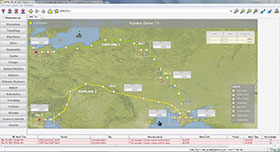

Yokogawa Electric has released the Enterprise Pipeline Management Solution (EPMS) R1.03, the latest version of an enterprise level pipeline applications suite that was first released to the market in June 2015. The EPMS suite is the product of over 20 years of Yokogawa experience in implementing oil and gas pipeline management solutions across the globe.
Developed for deployment at the heart of the pipeline operations management environment, the EPMS supplements a core scada platform with specific gas and liquid applications that enable a pipeline operator to manage delivery contracts and associated logistics in a safe, cost effective and efficient manner.
Development background
Many pipeline scada systems that are in use today have been tailored to suit a specific set of circumstances. They lack both a standard system foundation for supporting pluggable application modules and a core design that ensures interoperability with enterprise IT environments and policies. The maintenance and upgrade of tailor-made applications that often have a complex system architecture for protection from security breaches pose increasing challenges for pipeline operators.
The EPMS suite is a sustainable solution made up of pipeline applications that may be used in combination with common supervisory and monitoring functions, and is based on a well-designed modular platform that is both IT friendly and secure. As no two pipeline applications are identical and operational philosophies can differ from one pipeline operator to the next, the EPMS suite allows the easy modification of templates and functions, without having to call in pipeline application experts. Furthermore, the EPMS can be offered in combination with advanced pipeline simulation solutions that both reduce commissioning time and enable the full simulation of the pipeline operations management environment for the training of operators.
Enhanced interface management
When transitioning from one product to another in a pipeline, a trans-mix that is of a certain volume and varies in quality will be formed at the interface between the adjacent fluids. With EPMS R1.03, multiple product cuts from the same interface can be performed for the easy management of quality gradations. Furthermore, the use of product density meters to detect variations in interface quality based on colour and sulphur content is now supported.
Shared use of physical devices
For the delivery of products to different tanks, EPMS R1.03 allows multiple flow paths to share use of the same physical meter. This is made possible by the assignment of a logical meter to each flow path. The assigned logical meters are then associated with a specific physical meter. This is cost-effective as it reduces the number of physical meters that are required to cover a specific application.
Enhanced batch management
For greater flexibility, continuity, and energy efficiency, EPMS R1.03 supports side stream injection and stripping as a product batch passes an intermediate delivery or receiving site. The main benefits here are the opportunity to adjust the volume of a main batch easily and to manage sudden changes in demand more efficiently. For further optimisation, enhancements are provided for split/merge and local batch operations. “With multi-product pipelines, EPMS R1.03 will bring significantly enhanced flexibility in the management of batches, interfaces and scrapers,” says Shigetsugu Betchaku, Yokogawa’s global business development manager for the oil and gas midstream sector.
Yokogawa’s EPMS software suite is based on more than 20 years of experience in delivering oil and gas pipeline automation solutions around the globe. This suite of pipeline management applications incorporates the same knowledge and capabilities that went into the development of FAST/TOOLS R10.01, released in 2014.
Functions handled by the EPMS suite include:
• Gas/liquid nomination and metering.
• Energy value calculation.
• Batch and tank management (multi-product liquids).
• Pipeline integrity monitoring.
• Compressor/pump energy monitoring.
Yokogawa is active in the industrial automation and control (IA), test and measurement, and aviation and other businesses segments. The IA segment plays a vital role in a wide range of industries including oil, chemicals, natural gas, power, iron and steel, pulp and paper, pharmaceuticals, and food. The main target markets for the EPMS are oil and gas upstream or midstream pipelines and associated facilities.
For more information contact Christie Cronje, Yokogawa South Africa, +27 (0)11 831 6300, [email protected], www.yokogawa.com/za
| Tel: | +27 11 831 6300 |
| Email: | [email protected] |
| www: | www.yokogawa.com/za |
| Articles: | More information and articles about Yokogawa South Africa |

© Technews Publishing (Pty) Ltd | All Rights Reserved